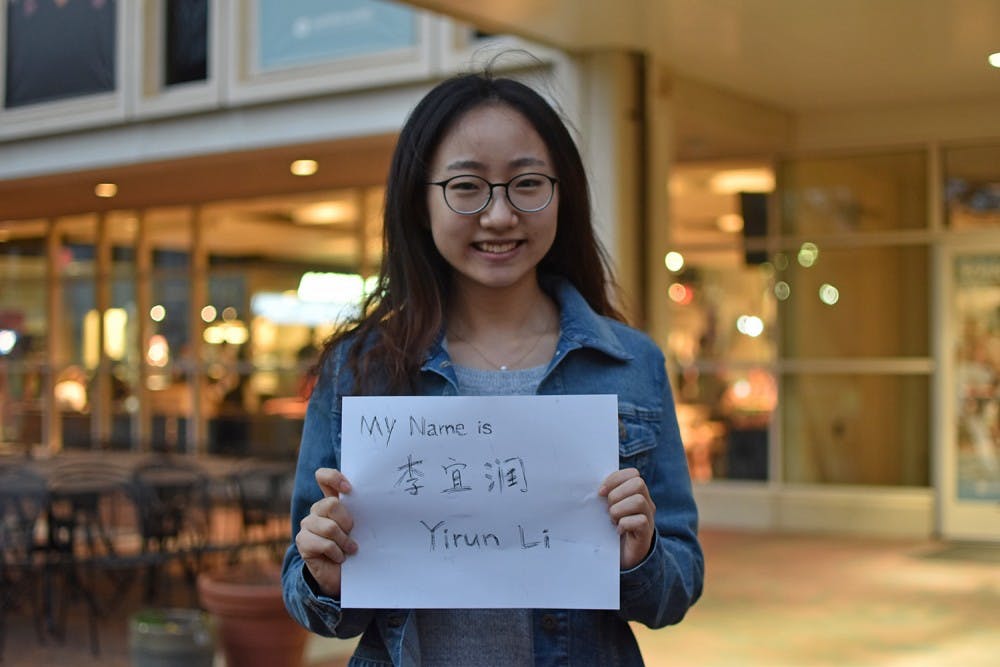“When I came here, everyone asked me ‘what’s up?’ and ‘how are you.’ I just don’t know how to answer those questions and the standard answer for this question from the textbook is ‘fine. I’m fine. Thank you, and you?’” Feng said.
“I learned that’s not a good answer actually and I need to answer ‘good. How about you?’— something like that.”
Aside from struggling to be social, Li said it is very difficult to take classes in English.
“That’s what keeps most international students away from the arts, like non-STEM majors — the language barrier,” she said.
“You probably notice a lot of international students, they’re staying in the library the whole time because our stress level is higher, because we want to stay in the United States for jobs.”
Hua, a philosophy major, said it is more difficult for international students to find a job in the United States after graduation. She said Trump’s discussion of making H1-B visas harder to get has made the situation even more challenging.
“It’s almost unreasonable because you don’t choose where you come from,” she said.
“A lot of us come to America believing democracy. But then we become frustrated because of a new policy and we are actually not being fairly treated here.”
Elizabeth Barnum, UNC’s director of international student and scholar services, said it can be difficult for international students to understand the culture of the classroom and fast-paced English.
“For many students who have really, really good proficiency in English, this is the first time they’re using English all day, every day,” she said.
“That can be exhausting. Your brain is just kind of on overload because you’re working a lot harder than when you’re speaking your first language.”
Barnum’s office, along the Writing Center, is available to assist international students in acclimating to the United States and the U.S. system of education.
To get the day's news and headlines in your inbox each morning, sign up for our email newsletters.
“We help people out with everything from how to get a driver’s license, to how do I put my child in kindergarten, to anything you can imagine that people encounter when they’re in a different country and a different system,” Barnum said.
“As long as I have been doing this, and I’ve been doing this for a really long time — since 1985 — we still at least once a week get a question we’ve never heard before.”
Gigi Taylor, an English as a Second Language specialist at the Writing Center, said international students who are admitted to UNC are just as competitive as other students admitted, but international students are still exposed to a lot of challenges in language proficiency.
She said the Writing Center is trained to assist international students with the same issues other students face and with the issues unique to them.
“International students probably do come in a little more concerned about getting language-level feedback, but they are as concerned about whether or not their arguments are compelling, or their writing is generally easy to follow, or if it is as well organized,” Taylor said.
“They get the extra layer of support that the native speakers don’t need.”
Deb Aikat, a professor in the School of Media and Journalism, said he is able to speak three languages and can closely relate to the challenges of multilingual students in the classroom.
“If (international students) have something to convey in their languages, I ask them to present it to the class,” he said.
“I encourage my students to be flexible in learning other cultures.”
Political science professor Frank Baumgartner said he’s studied overseas in other languages and tells his international students he’s been in their shoes.
“I’ve tried to make informal accommodations, like if they want to come talk, or if they need more time for an exam, certainly if they want to hand in their paper and have me read it, something like that,” he said.
“I’ve been teaching for a long time and I’ve had a lot of international students, but I haven’t had a student where I thought they couldn’t communicate well enough in English to meet the requirements.”
Although UNC offers many accommodations for international students within the classroom, Hua said international students will face challenges UNC can’t accommodate.
“It’s a good opportunity to explore the world and being international does give you a somewhat alienation feeling — not just because I’m international, but also because I’m Asian,” she said.
“Sometimes, especially this time, we can really see a lot of inequality and discrimination and bias going on, and it’s a little frustrating.”
university@dailytarheel.com




